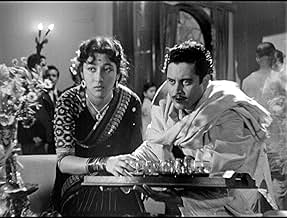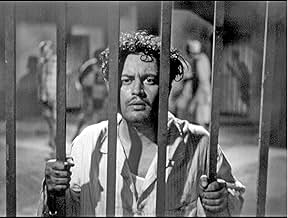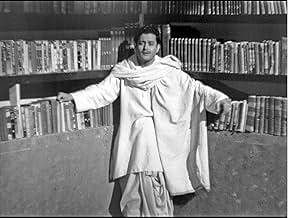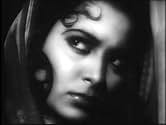IMDb-BEWERTUNG
8,3/10
7783
IHRE BEWERTUNG
Füge eine Handlung in deiner Sprache hinzuVijay, a talented but indigent poet, struggles for love and recognition in this selfish world.Vijay, a talented but indigent poet, struggles for love and recognition in this selfish world.Vijay, a talented but indigent poet, struggles for love and recognition in this selfish world.
Rehman Khan
- Ghosh
- (as Rehman)
Leela Mishra
- Vijay's Mother
- (as Leela Misra)
Moni Chatterjee
- Chatterjee
- (as Moni Chatterji)
Empfohlene Bewertungen
A musical melodrama from the Hindi film industry of Bombay, now popularly known as "Bollywood", although it wasn't called that back then. Well this movie is certainly a lot better than any of the more recent "Bollywood" musicals I've seen, and it's probably even one of the best musicals I've ever seen from anywhere. What really stands out in Pyaasa in particular is how the music is often used to express serious themes and social critiques, which is something I've rarely ever seen in a musical. The ending was also quite unexpected and very moving. The last few scenes and dialogues in particular were powerful and had a lot of meaning to them.
The star of the show here is Guru Dutt, who was not only the director and producer, but also starred in the film as the protagonist Vijay (a struggling poet from the slums), comparable to the versatility of Orson Welles in Citizen Kane. The two main actresses in the film, Mala Sinha as the married ex-girlfriend Meena and especially Waheeda Rehman as the prostitute Gulabo, were also impressive. In some ways, the story has some similarities to that of Moulin Rouge! (2001) but even better than that in my opinion. The music by S. D. Burman and his son R. D. Burman also has a timeless feel to it. I would highly recommend this movie to musical fans, or even if one is not a musical fan, I still think it's worth checking out.
9/10
The star of the show here is Guru Dutt, who was not only the director and producer, but also starred in the film as the protagonist Vijay (a struggling poet from the slums), comparable to the versatility of Orson Welles in Citizen Kane. The two main actresses in the film, Mala Sinha as the married ex-girlfriend Meena and especially Waheeda Rehman as the prostitute Gulabo, were also impressive. In some ways, the story has some similarities to that of Moulin Rouge! (2001) but even better than that in my opinion. The music by S. D. Burman and his son R. D. Burman also has a timeless feel to it. I would highly recommend this movie to musical fans, or even if one is not a musical fan, I still think it's worth checking out.
9/10
Hindi cinema cops a lot of flak for its escapist fluff, and rightly so, when it churns out drek like MPKK, HSSH and HTHS with depressing frequency. It was, however, not always so. Pyaasa reminds us that the Golden Age of Hindi cinema was just that, truly golden. There is almost nothing at all to fault with this gem. I'm listening to Sar Jo Tera Chakraye while I type this, but the whole soundtrack is outstanding, and the story, both in design and execution is a great demonstration of the fact that commercial cinema _can_ be fine art, too.
The evocation of atmosphere is well-done, and the main characters are well drawn. Johnny Walker is, as always, excellent in the comic relief. Some have said that they found him an intrusion, but for me, this very un-comic movie benefited from a little lightening touch from the inimitable Johhny. Subhaan Alaah that it wasn't Johnny Lever!
I love every song in the soundtrack, and think that it is the best soundtrack from any of the 320 or so Hindi films I've seen. It is, in my opinion, rare to find a Hindi film in which the songs work very well both in the film AND on their own. Sometimes, there are boring films with great songs, like Swades, and sometimes there are unremarkable songs that work well inside the film, like Dhadak Dhadak from "Bunty aur Babli". In Pyaasa though, every song fits AND every song survives apart from its context in the film.
However, the clincher for me the ending. There are maybe three or four Hindi films I've seen with almost perfect endings, in terms of being right for the film. I would say that they are, Dil Se (breathtaking and brave, but absolutely right for that film), Page 3 (the 21st century Pyaasa in its storyline, to me) and at the top of the heap, Pyaasa. The fade out to Yeh Duniya Agar is utterly perfect. I love this film to bits, and it was the ending that sealed it for me.
The evocation of atmosphere is well-done, and the main characters are well drawn. Johnny Walker is, as always, excellent in the comic relief. Some have said that they found him an intrusion, but for me, this very un-comic movie benefited from a little lightening touch from the inimitable Johhny. Subhaan Alaah that it wasn't Johnny Lever!
I love every song in the soundtrack, and think that it is the best soundtrack from any of the 320 or so Hindi films I've seen. It is, in my opinion, rare to find a Hindi film in which the songs work very well both in the film AND on their own. Sometimes, there are boring films with great songs, like Swades, and sometimes there are unremarkable songs that work well inside the film, like Dhadak Dhadak from "Bunty aur Babli". In Pyaasa though, every song fits AND every song survives apart from its context in the film.
However, the clincher for me the ending. There are maybe three or four Hindi films I've seen with almost perfect endings, in terms of being right for the film. I would say that they are, Dil Se (breathtaking and brave, but absolutely right for that film), Page 3 (the 21st century Pyaasa in its storyline, to me) and at the top of the heap, Pyaasa. The fade out to Yeh Duniya Agar is utterly perfect. I love this film to bits, and it was the ending that sealed it for me.
Guru Dutt had the theme for "Pyaasaa" running in his mind for 4 years before he actually got around to making it. He followed the counsel of friends who advised him to make some money before venturing on such an offbeat drama and made such purely commercial, but thoroughly enjoyable, films as "Aar Paar", "C.I.D" and "Mr & Mrs 55" which were all commercially very successful.
"Pyaasa" starts brilliantly - a man lying down, staring at the sky, the flowers - all very happy. A bee starts buzzing over a flower and then, moves down to the grass. The smile on the poet's face is broken as a man's boot uncaringly descends on the bee. Thats more or less the theme of the film. The uncaring attitude of the society where the struggling ones are trampled over mercilessly. Laced through this is the whole romance triangle with one lady dumping her lover for a well-to-do businessman for the sake of money, and a prostitute who loves the poet truly.
The film is filled with some memorable moments and lots of brilliant shots. My favourite is the sequence where Dutt tries to commit suicide is magnificent - there is no dialogue through that 3 minute sequence. But I think the scene would have been even more remarkable had there been no background music.
V.K.Murthy does an outstanding job with the camera. I compare the Guru Dutt-Murthy combo to the Orson Welles-Greg Tolland combo that created "Citizen Kane". Murthy was even better in "Kaagaz ke phool" - but thats for later. This film is an absolute visual treat.
S.D.Burman does a fair job with the music but it is really Sahir Ludhianvi's poetry thats the pride of the songs in this film. Stinging sharp, the words slam the devious ways of the world, the mercenary nature of the society. The climax, though a trifle melodramatic, is brilliantly conceived.
All in all, this is a film thats worth preserving in your DVD collection. This was Guru Dutt's best film and that is saying a lot ! He is now usually touted as the greatest film director in the commercial world of Hindi films. He demonstrates how a film can be both artistically satisfying as well being throughly entertaining to the masses.
"Pyaasa" starts brilliantly - a man lying down, staring at the sky, the flowers - all very happy. A bee starts buzzing over a flower and then, moves down to the grass. The smile on the poet's face is broken as a man's boot uncaringly descends on the bee. Thats more or less the theme of the film. The uncaring attitude of the society where the struggling ones are trampled over mercilessly. Laced through this is the whole romance triangle with one lady dumping her lover for a well-to-do businessman for the sake of money, and a prostitute who loves the poet truly.
The film is filled with some memorable moments and lots of brilliant shots. My favourite is the sequence where Dutt tries to commit suicide is magnificent - there is no dialogue through that 3 minute sequence. But I think the scene would have been even more remarkable had there been no background music.
V.K.Murthy does an outstanding job with the camera. I compare the Guru Dutt-Murthy combo to the Orson Welles-Greg Tolland combo that created "Citizen Kane". Murthy was even better in "Kaagaz ke phool" - but thats for later. This film is an absolute visual treat.
S.D.Burman does a fair job with the music but it is really Sahir Ludhianvi's poetry thats the pride of the songs in this film. Stinging sharp, the words slam the devious ways of the world, the mercenary nature of the society. The climax, though a trifle melodramatic, is brilliantly conceived.
All in all, this is a film thats worth preserving in your DVD collection. This was Guru Dutt's best film and that is saying a lot ! He is now usually touted as the greatest film director in the commercial world of Hindi films. He demonstrates how a film can be both artistically satisfying as well being throughly entertaining to the masses.
Guru Dutt was indeed a visionary, so many of his ideas are much ahead of not only those times but our times as well. Pyaasa is one of his most acclaimed movies. One can see why. This is the story of Vijay, an unemployed poet who struggles through his loneliness, lack of job, and 'good-for-nothing' image. Having left his house where his brothers maltreated him for the same, he wanders in the streets. He puts his heart and soul into writing poems but then no one takes notice of them and they remain unpublished. The story follows his acquaintance with a young prostitute named Gulabo and his renewed meeting with his college sweetheart Meena who left him to marry a wealthy man. What happens when an aimless and embittered Vijay generously gives his coat to a beggar is what takes the whole thing much further.
Being a poet's story, the film is appropriately and incredibly poetic in tone, with amazing dialogues bringing so much depth and finesse to it. Today, some of them have become unforgettable sayings. Dutt's direction is excellent. He pays attention to the smallest of details, keeps the film consistently realistic, ultimately managing to build a wonderfully captivating and engaging picture. True to its musical style, the narrative is full of songs, and never do they take away from the efficiency of the script. They actually contribute to it as they either enhance the emotional impact or relieve the intensity. It is this rare mix of melodious numbers and serious, atmospheric proceedings that marks this film's success. The cinematography is very effective, and, just like the songs, it often manages to capture the characters' state of mind.
One of the most impressive aspects about this film, among others, is the matter-of-fact style of story-telling, which is still missing in Hindi films today, as well as Dutt's portrayal of relationships. The character of Gulabo, a golden-hearted prostitute is very impressively atypical. She is neither exaggerated and vulgar nor over-generous. She is pretty much a real good-hearted person, who does have her share of toughness, but she is never presented as a poor victim. The interaction between Vijay and Gulabo is very credible as it is never saccharine or sentimental and it lacks any sort of 'love against all odds' clichés. We actually never see if he really loves her. She, however, loves him unconditionally which has got to do a lot with the fact that she's a fan of his poems and that he's one person who shows respect to her.
Mala Sinha's Meena, however, is the complete opposite. As Vijay says, "for her, love is a hobby and she can barter it for material comfort." But I love this character, because she looks at life from a sane and practical perspective. She is greedy, but she is honest enough to admit it, something that suits her persona brilliantly. In the conversation scene, which is one of the very best in the film, she directly tells Vijay she did not want to marry an unemployed man without any future. She says the memorable line, "in life, besides poetry and love there's hunger". Whether you agree or disagree, that's true. Another highly precious and probably the most haunting aspect in the entire film is the portrayal of Vijay's relationship with his loving and caring mother. It is given very little screen time, and yet it's so strongly impactive and touching.
Acting-wise, Guru Dutt is excellent in an author-backed role which only he could play given he had the idea of how it should have been done. He gets into the skin of the character, and remains thoroughly in-sync with it. Mala Sinha is brilliant as she is in probably every film and she displays the negative shades of her role as well as her inner compassion very well. It is Waheeda Rehman, however, who shines the most with a role that allows her to grow through the film and draw the audience's sympathy with her heartfelt and authentic portrayal. Rehman, Johnny Walker and particularly Leela Mishra as Vijay's mother, provide excellent support. "Life's real joy lies in making others happy", a memorable line by Dutt, and that's what this film is all about. Pyaasa is overall a poignant and moving classic, highly recommended.
Being a poet's story, the film is appropriately and incredibly poetic in tone, with amazing dialogues bringing so much depth and finesse to it. Today, some of them have become unforgettable sayings. Dutt's direction is excellent. He pays attention to the smallest of details, keeps the film consistently realistic, ultimately managing to build a wonderfully captivating and engaging picture. True to its musical style, the narrative is full of songs, and never do they take away from the efficiency of the script. They actually contribute to it as they either enhance the emotional impact or relieve the intensity. It is this rare mix of melodious numbers and serious, atmospheric proceedings that marks this film's success. The cinematography is very effective, and, just like the songs, it often manages to capture the characters' state of mind.
One of the most impressive aspects about this film, among others, is the matter-of-fact style of story-telling, which is still missing in Hindi films today, as well as Dutt's portrayal of relationships. The character of Gulabo, a golden-hearted prostitute is very impressively atypical. She is neither exaggerated and vulgar nor over-generous. She is pretty much a real good-hearted person, who does have her share of toughness, but she is never presented as a poor victim. The interaction between Vijay and Gulabo is very credible as it is never saccharine or sentimental and it lacks any sort of 'love against all odds' clichés. We actually never see if he really loves her. She, however, loves him unconditionally which has got to do a lot with the fact that she's a fan of his poems and that he's one person who shows respect to her.
Mala Sinha's Meena, however, is the complete opposite. As Vijay says, "for her, love is a hobby and she can barter it for material comfort." But I love this character, because she looks at life from a sane and practical perspective. She is greedy, but she is honest enough to admit it, something that suits her persona brilliantly. In the conversation scene, which is one of the very best in the film, she directly tells Vijay she did not want to marry an unemployed man without any future. She says the memorable line, "in life, besides poetry and love there's hunger". Whether you agree or disagree, that's true. Another highly precious and probably the most haunting aspect in the entire film is the portrayal of Vijay's relationship with his loving and caring mother. It is given very little screen time, and yet it's so strongly impactive and touching.
Acting-wise, Guru Dutt is excellent in an author-backed role which only he could play given he had the idea of how it should have been done. He gets into the skin of the character, and remains thoroughly in-sync with it. Mala Sinha is brilliant as she is in probably every film and she displays the negative shades of her role as well as her inner compassion very well. It is Waheeda Rehman, however, who shines the most with a role that allows her to grow through the film and draw the audience's sympathy with her heartfelt and authentic portrayal. Rehman, Johnny Walker and particularly Leela Mishra as Vijay's mother, provide excellent support. "Life's real joy lies in making others happy", a memorable line by Dutt, and that's what this film is all about. Pyaasa is overall a poignant and moving classic, highly recommended.
Pyaasa does show its age. There are a lot of things that would perplex or annoy the modern viewer such as jumps in continuity and a simplistic set of characters. However, if one looks past that, then the movie reveals a rich story and a deep message. This is even more astonishing considering that the movie was made in the 50s.
This film is a journey into the mind of Guru Dutt and shows the hurt that sensitive minds, such as those of poets', can feel in modern society. As such, its message transcends time and is still relevant today. Those with less sensitive dispositions, such as mine, will not feel left out and will surely appreciate the story too.
The dialogue is beautiful and the songs are sublime. This is a real pity for those who do not understand Hindi since the subtitles (although decent) rob the words of much of their beauty. I know from other reviews on this site that non-Indian viewers often rightly skip the much-disliked song sequences. I still recommend that they sit through them with the subtitles, of course, turned on. This will convey some sense of the beauty of the songs.
There are several moments when the movie seems idiosyncratic. On both occasions that Abdul Sattar (Johnny Walker) broke out into song, the sudden "change" in his voice seemed absurd. Similarly, several bits of dialogue were almost comical when they were meant to be serious, especially in the case of the first publisher. The video itself looks jaded and the sound leaves a lot to be desired. But as I stated earlier, one must look past this to truly enjoy this splendid movie.
One of the striking things about the movie that I must mention is how much India seems to have changed since 1957. Perhaps this is because of the way the movie was shot. The Indian city of the 50s seems very wide and open and even though it is shown teeming with people, there is certain spaciousness about the whole thing. This stands in stark contrast to the clustered urban environment of today.
In all, I would highly recommend this movie to film lovers, both Indian and otherwise.
This film is a journey into the mind of Guru Dutt and shows the hurt that sensitive minds, such as those of poets', can feel in modern society. As such, its message transcends time and is still relevant today. Those with less sensitive dispositions, such as mine, will not feel left out and will surely appreciate the story too.
The dialogue is beautiful and the songs are sublime. This is a real pity for those who do not understand Hindi since the subtitles (although decent) rob the words of much of their beauty. I know from other reviews on this site that non-Indian viewers often rightly skip the much-disliked song sequences. I still recommend that they sit through them with the subtitles, of course, turned on. This will convey some sense of the beauty of the songs.
There are several moments when the movie seems idiosyncratic. On both occasions that Abdul Sattar (Johnny Walker) broke out into song, the sudden "change" in his voice seemed absurd. Similarly, several bits of dialogue were almost comical when they were meant to be serious, especially in the case of the first publisher. The video itself looks jaded and the sound leaves a lot to be desired. But as I stated earlier, one must look past this to truly enjoy this splendid movie.
One of the striking things about the movie that I must mention is how much India seems to have changed since 1957. Perhaps this is because of the way the movie was shot. The Indian city of the 50s seems very wide and open and even though it is shown teeming with people, there is certain spaciousness about the whole thing. This stands in stark contrast to the clustered urban environment of today.
In all, I would highly recommend this movie to film lovers, both Indian and otherwise.
Wusstest du schon
- WissenswertesDilip Kumar was the first choice for the lead role but due to his absence on the opening day of shooting due to unknown reason director Guru Dutt decided to act as the lead actor.
- VerbindungenFeatured in Road, Movie (2009)
- SoundtracksJinhen Naaz Hai Hind Par Woh Kahaan Hain
Sung by Mohammad Rafi
Music composed by Sachin Dev Burman
Lyrics by Sahir Ludhianvi
Top-Auswahl
Melde dich zum Bewerten an und greife auf die Watchlist für personalisierte Empfehlungen zu.
- How long is Thirst?Powered by Alexa
Details
- Laufzeit2 Stunden 26 Minuten
- Farbe
- Seitenverhältnis
- 1.33 : 1
Zu dieser Seite beitragen
Bearbeitung vorschlagen oder fehlenden Inhalt hinzufügen































